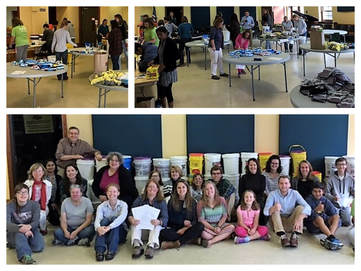 Last two pages below, listen to the whole sermon at: http://www.huntingdonstonechurch.org/sermons/hunger-september-24-2017 There is no mistake, no sin or flaw, not the worst act you can think of, that makes us or anyone unworthy of love or food or shelter. The parable Jesus tells of this hungry son gets used to teach repentance, but the character doesn’t sound very repentant. In fact, biblical scholar Amy-Jill Levine argues that his “lack of remorse is [found in] his line, “I have sinned against heaven and before you.” Biblically literate listeners would hear an echo of the empty words Pharaoh mouths…to stop the plagues.”[1] We read in Exodus “Pharaoh hurriedly summoned Moses and Aaron and said, ‘I have sinned against the Lord your God, and against you.’” (Exod. 10:16). Levine says the people listening to Jesus tell this story would’ve known from this familiar phrase that “The prodigal is no more repentant, has had no more change of heart, than Egypt’s ruler.”[2] And still, the hungry son will eat his fill. We will never be so flawed that we are unworthy of food or love or shelter. We can invite ourselves and each other to another way of being, again and again, we can do it quietly, we can make referrals, we can give gift cards rather than cash. We can donate to organizations rather than individuals. We can give spare change or big bucks or sandwiches or hot chocolate or advice or prayer. We can choose tough love, high expectations and mutual accountability. But even tough love must come on a full stomach. “If you love me,” Jesus told Peter, “feed my sheep.” Three times he said it. Three times Peter would deny Jesus, in his fear, three times Peter would hide from the truth. Three times, Jesus told Peter, love me by feeding others, by filling bellies, by leaning right into the need. Not just when the hungry person looks like us, looks receptive to charity, looks like they’ll really appreciate the food and know how to pull themselves up by their bootstraps. Not just when we can easily stare into this person’s hungry, thirsty, aching face. “But Lord, if we had known it was you hungry, we would’ve fed you, if we had known it was you thirsty, we would’ve brought you a drink! If we had known you were in prison, of course we would have visited you!” We know what Jesus says, “anytime you care for the least of these, you care for me.”  Anytime you gather emergency cleanup supplies for people you’ll never meet, and you bring so much the young people can’t carry them. This is prodigal giving! The word “prodigal” means excessive, wasteful, too much. We don’t know who named the parable this way, for the first couple centuries that we had this story in writing it was usually called the parable of the two sons.[3] We don’t know who named it the Prodigal Son, and really we can’t say which son is supposed to be the prodigal one. Seems like the one who wasted his money is the prodigal, excessive son. But the older son might be prodigal, excessive, in his resentment – though I sympathize with him! And of course the father’s grace and forgiveness is prodigal, excessive, for a son who might not even be showing remorse. Thomas McGovern writes of the father, “He met the excesses of his son’s irresponsibility and self-indulgence, the failures of his own lack of courage to set boundaries, with forgiveness and mercy. It is a humble act, eating crow, after hearing that his son ate among the pigs. The father’s distinctive character strength rested in his unequivocal or unconditional manner.”[4] Whatever you choose on freeway ramps or downtown corners or in your family or in yourself, first choose love. Say yes or say no--say it with eye contact and a smile. I see you, I accept you, even in your need I can see your holy humanness and will not turn away. Your hunger is just as worthy as mine, as anyone else’s. Choose love, until all are fed. Hunger is universal and also particular. It’s universal because we all get hungry. No matter how fat or thin or rich or poor we are. No matter if you ate like me at Heritage Fair yesterday and thought you’d never get hungry again! Hunger is also particular, like the American, Russian and Tanzanian seminary students reading the parable teach us. The malnourished child in South Sudan has no food to eat – there just isn’t any food available. The malnourished child in rural Mississippi can only find junk food, empty calories, because wholesome food is hours away and no one in the neighborhood has a garden anymore. This month we’ve been exploring the spiritual nourishment part of our vision. Just like physical nourishment comes with context, just as physical nourishment requires justice work, spiritual nourishment is the same. As we seek to be a Christ-centered community where all are spiritually nourished we know that while all of us are spiritually hungry, some of us are spiritually malnourished. Some of us have been shamed by churches for being gay or getting divorced or wearing the wrong clothes or praying the wrong way. I pray that never happens here! Some of us are in a life crisis – our own health struggles or caring for someone in our family or unemployment or drowning in debt. These crises give us sharp spiritual hunger pain. If you’re not in a crisis, you can offer others more spiritual nourishment in this season, and later it will be your turn to be held by others. But we all must be fed, spiritually and physically. We’re different in wealth and health and status and privilege but we all have to eat. As Jesus’ story reminds us, God calls us to join the feast. Whether we’ve been the reckless, remorseless younger son, the resentful, older son, the father who couldn’t say no, the feast is ready – come on, let’s eat! [1] https://www.christiancentury.org/article/2014-08/parable-and-its-baggage [2] https://www.christiancentury.org/article/2014-08/parable-and-its-baggage [3] https://rsc.byu.edu/archived/volume-4-number-1-2003/names-parables [4] Jesus and Well Being: A Spiritual and Psychological Good News Story by Thomas V. McGovern
0 Comments
Leave a Reply. |
Archives
January 2022
|

 RSS Feed
RSS Feed